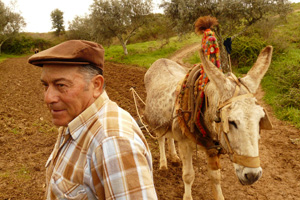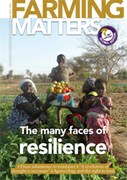The Alentejo is the largest and poorest region of Portugal. Cooperatives and other social initiatives that arose after the Carnation Revolution in 1974 were later closed under pressure from the European Union. It was hoped that massive investments would make Portugal a role model for economic development, but the financial crisis has revealed the flaws in those dreams. And more complex legal regulations make life even harder for traditional small scale producers. However, they continue to use and defend local markets even in the face of criminalisation.

Her 58 year old daughter Eusébia produces goat cheese in her kitchen that she sells for €1 each. José Manuel, a few blocks down the road, bakes a few more loaves than his family needs, which he sells to neighbours to supplement his meagre pension.
Other villagers gather mushrooms for sale. And if they run out of bottles of medronho at the local bar – a popular local liquor made from the strawberry tree – the owner goes to the garage to get a bottle of homemade brew he bought from old Tomás, one of the village elders. The restaurant, owned by Maria Inacia Chavez (photo), is also now illegal.
These are examples of traditional and informal trade conducted without invoices. You can call it tradition, adding to quality of life and local ‘colour’. But in times of crisis, such sharing and selling amongst neighbours becomes more important than this – it helps people to survive.
Austerity
Under pressure from the ‘troika’ (the International Monetary Fund, European Commission and the European Central Bank), Portugal has been forced to act against the best interests of its own people. Unlike France, Portugal has not negotiated special conditions for its small business owners. And following the crisis, the government responded with a swathe of austerity measures.
The consequences? Small producers, bars, kitchens, shops and bakeries that make up traditional culture in rural parts of the country are now illegal, in fact, because they do not meet the new ‘business’ criteria. However, to obtain the required business permit, producers have to meet a list of requirements and make investments that are only feasible for large scale operations.
Negative impacts
The new regulations led to the close of many local markets where before, villagers had been able to sell their products and earn a little extra money. Meanwhile, the local tax office recently employed 1000 new tax auditors.
People involved in the local production and trade of food now find themselves criminalised. The government is painting many ordinary people as tax avoiders and even as those who helped create the crisis – when they are just trying to ‘get by’ as best they can. In the small village of Amoreiras, the local authority fined a group who made and sold charcoal as they have done for decades. The average age of the ‘offenders’ was 70.
Adérito Pereira is the owner of a small village bar. He had to purchase a modern cash register and became very frustrated. “If a client asks, I have to give them a bill. If it was for an omelette, then the taxman also expects to see an invoice for eggs. If I use the eggs from my own chickens, this is not allowed and I am considered illegal.”
Former history professor Antonio Quaresma said; “If local products disappear, replaced by industrial production, obviously the large corporations stand to profit instead of the local economy.”
He also paints a bleak picture of some current practices. “Some land in the Alentejo is leased to international companies for olive cultivation or irrigated greenhouse horticulture, often employing labour from Bulgaria, Thailand or elsewhere. After a few years the soil becomes leached and chemically overloaded.” Most of the benefits leave the area, and do such companies always pay their full due of taxes?
Fighting back

There exists a compelling slogan, ‘where injustice becomes law, resistance becomes a duty’. We think this applies in the Alentejo. The authorities and decision-makers are too far away from the reality on the ground, and it is morally wrong to deny the traditional rights of older people in their home villages as they struggle to maintain a livelihood. It is also strategically incomprehensible. The Alentejo is a region that still holds and shares traditional knowledge, methods and practices and retains strong social cohesion within communities. This rare cultural treasure is being destroyed.
But the Portuguese are increasingly raising their voices. Several times in 2013, up to a million people protested against the troika, or one in ten of the population. Many also show creativity and determination in their civil disobedience. When parliament was debating a law that would force restaurant customers to actively request an invoice, tens of thousands of people gave the tax number of the Prime Minister instead of their own. The law was hurriedly retracted. There are also many village mayors who do not accept that informal local markets should be banned. To get around the rules, they operate under the name mostra (or exhibition, not sale) of local goods. If someone really wants to give something away and someone happens to put money into a donation box, well, who can prevent that?
There are also cases of civil disobedience. People in Alentejo ask at restaurants for homemade dishes using local produce and do not request receipts. Local exchange systems are developing. Shop owners find that a donation box at the entrance for certain goods brings them more profit than modern cash registers. And maybe local currencies could develop to further circumvent the rigid tax laws.
Linking together
Beyond food – options for decentralised sustainability…
- Natural water management. Large dams provide water for industrial uses, but decentralised water management approaches such as rainwater harvesting and soil and water conservation offer opportunities better adapted to local needs.
- Decentralised energy autonomy. Alentejo is well known for its sunshine, so why not focus on solar power to provide the energy?
- Farming with biodiversity. Organic farming, intercropping, agroforestry and permaculture all offer the potential to produce more food sustainably, heal environmental damage and provide economic benefits.
- Community based economies. The use of local currencies can ensure that profits are retained in the area, creating responsible growth and reinvestment in the local communities.
Fortunately, when facing up to a crisis, any crisis, there appears a natural tendency for people to work closer together, for mutual aid, self-sufficiency and a renewed community spirit. Such cooperation also helps to soften the negative impacts, and can help to lead the way towards its resolution. This is true not only for the Alentejo, nor for Portugal as a whole.
The more unreliable the supply systems of the global economy becomes, the more we need to expand local subsistence to regional and national levels.
Sustainability models
What we learn from the Alentejo is that models for regional autonomy evolve organically from crisis-stricken areas. In regions where agroecological, technological, social and economic knowledge is locally applied, the whole social landscape flourishes. This reveals a positive side of the crisis, where people tend to develop a greater openness to cooperation and experimentation.
In Portugal, unexpected alliances are consolidating. The urban youth protesting and the rural elderly realise that they have similar goals. More people from the cities want to return to the countryside, not from a romantic notion, but because urban lifestyles are increasingly difficult to sustain with rising food, energy and rental costs, and falling salaries. In the villages where perhaps their parents or grandparents came from, they hope for better opportunities. But most lack the necessary knowledge to build and develop their living conditions.
Two years ago, responding to this situation, the ‘12 de março’ (March 12th) initiative led to the foundation of the ‘Academia Cidada’, a citizens academy where people can learn what it takes to make a living independently from the system. It is allied to the Transition Towns movement, the Global Ecovillage Network and many other initiatives. “We want to bring local and international knowledge carriers and policy makers together with the aim of collectively building up a model region”, said Vera Kleinhammes, involved in the Global Campus, an education initiative based in Alentejo. “Knowledge of ecological and social sustainability which we have collected together with our partners in Africa, South America, Asia and Europe could help Alentejo transform from a problem case to a model for all of Europe.”
Leila Dregger
Leila Dregger is a German journalist. She currently works for the Global Ecovillage Network and lives in the Tamera Peace Research Center in Portugal.
Email: leila.dregger@snafu.de

